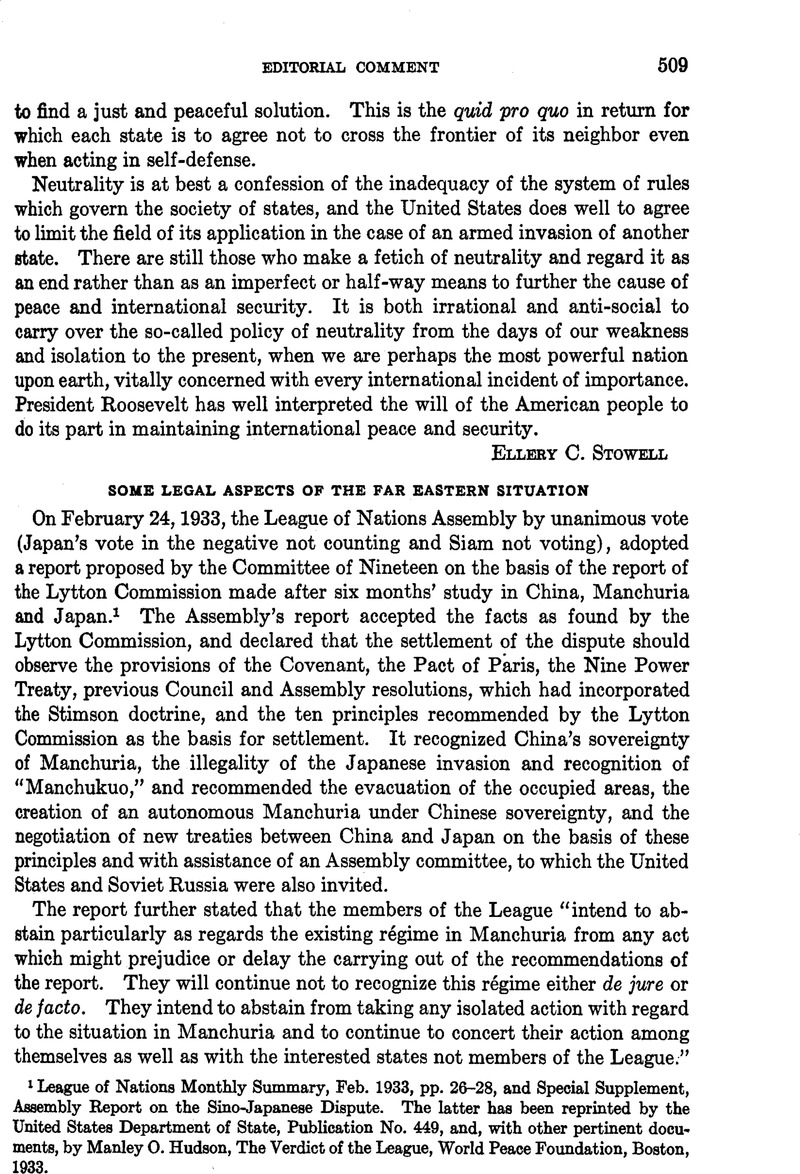Article contents
Some Legal Aspects of the Far Eastern Situation
Published online by Cambridge University Press: 12 April 2017
Abstract

- Type
- Editorial Comment
- Information
- Copyright
- Copyright,© by The American Society of International Law 1933
References
1 League of Nations Monthly Summary, Feb. 1933, pp. 26-28, and Special Supplement,Assembly Report on the Sino-Japanese Dispute. The latter has been reprinted by the United States Department of State, Publication No. 449, and, with other pertinent documents, by Hudson, Manley O. The Verdict of the League, World Peace Foundation, Boston,1933 Google Scholar
2 League of Nations, Discussion of Advisory Committee, March 15 and 28, May 10,1933; Pacific Affairs, April-May, 1933, p. 203 ff.
3 These and other measures are suggested in a report approved by the Assembly and Council in 1927, Monthly Summary, Oct. 1927, Vol. 7, p. 308; Jan. 1928, Vol. 7, pp. 356,376-378; Evans, Conwell The League Council in Action, Oxford, 1929, pp. 282-285; Wright, Proc. Am. Soc. Int. Law, 1932, p. 114 ff.Google Scholar
4 S. M., “ The New Japanese Budget,” Pacific Affairs, Feb.-March, 1933, p. 101 ff.;reprint from the Osaka Mainichi, of Feb. 2, 1933, “ Ignoring the Diet,” ibid., p. 110 ff.; “ Effects on Japan of Depreciation of the Yen,” American Council, Institute of Pacific Relations, Bulletin, Vol. 2, No. 2.
5 On March 7,1933, the Japanese occupation of Jehol was completed. Early in May, 1933,the Japanese forces approached Tientsin and Peiping and on May 31 a truce was signed creating a demilitarized zone in the area between the Great Wall and a line roughly from Peiping to Tientsin. (Current History, July, 1933, pp. 508-510.)
6 The latter group, which wishes “ to develop Manchuria as a source of raw materials to assist industrialization in Japan,” seems to be winning. See article by S. M., “ The New Economic Policy of Manchukuo,” Pacific Affairs, April-May, 1933, p. 211.
7 The government of “ Manchukuo” seems to be a “ local de facto government,” or “ government of paramount force,” as was the Confederate States of America, with powers similar to those of a military occupant. See Williams v. Bruffy, 96 U. S. 176, 186; Thorington v.Smith, 8 Wall. 1, 8-10; Borchard, Diplomatic Protection of Citizens Abroad, p. 206 ff.
8 Draft Convention on The Legal Position and Functions of Consuls, Art. 6 with commentary,Special Supplement, this Journal, Vol. 26 (1932), pp. 238-241.
9 States have made loans to foreign individuals and corporations. Such a transaction carries no implication that the borrower is a state.
10 DeWutz v. Hendricks, 1824, 2 Bing. 314; Kennett v. Chambers, 1852,14 How. 38.
11 “ Seeing that it is, for neutral powers, an admitted duty to apply these rules impartially to the several belligerents; seeing that, in this category of ideas, these rules should not, in principle, be altered, in the course of the war, by a neutral power, except in a case where experience has shown the necessity for such change for the protection of the rights of that power.”
12 Moore, Digest of International Law, Vol. 7, p. 148 ff.; Fish, American Diplomacy,p. 163 ff.
13 See Naval War College, International Law Documents, 1916, Documents from Chile,p. 22; 1917, Documents from Brazil, p. 64; Costa Rica, p. 77; Guatemala, p. 162; Peru, p. 198; Salvador, p. 210; Uruguay, p. 249. The latter country, following this decree, requested,on April 11,1918, whether Germany regarded war as existing, to which Germany replied in the negative on May 16, 1918 (ibid., 1918, p. 11).
14 Under authority of the Acts of 1912 and 1922 authorizing the President to proclaim an embargo on arms shipments to American countries or countries in which the United States has extraterritorial jurisdiction in case of domestic violence. See Chamberlain, “ The Embargo Resolution and Neutrality,” International Conciliation No. 251, June, 1929, p. 276 ff. “ ●The Senate Committee on Foreign Relations reported the resolution on May 30,1933,with an amendment requiring that the embargo “ shall apply impartially to all the parties to the dispute or conflict.”
15 Sen. Doc. 106, 66th Cong., 1st Sess., p. 501.
16 See Wright, “ Validity of the Proposed Reservations to the Peace Treaty,” Columbia Law Review, Feb. 1920, Vol. 20, pp. 146-150.
17 Wright, Mandates Under the League of Nations, pp. 41, 338, 445-447. The Covenant does not actually refer to the North Pacific Islands at all, but they have been treated as though covered by the expression “ certain of the South Pacific Islands” in par. 6 of Art. 22, see Miller, D. H., The Drafting of the Covenant, N. Y., 1928, Vol. 1, p. 114. Professor Sakutaro Tachi, of the Imperial University, Tokyo, has recently expressed the opinion that “ territorial rights” (dominium) are vested in the Principal Allied and Associated Powers; that “ the exercise of sovereignty” (imperium) is vested in the mandatory; and that the mandate, having the character of a treaty between the Principal Powers and the mandatory,can only be changed with the consent of each. (Contemporary Japan, June, 1933, pp. 34-40.) For the present writer's criticism of this theory, see op. cit., pp. 321-324,500-506.
18 Wright, Mandates under the League of Nations, pp. 439-440.
19 Ibid., p. 34 ff.
20 Ibid., pp. 45-56, 439-440.
21 Ibid., p. 440.
22 Permanent Mandates Commission, Minutes 22d Sess., pp. 114-115, 179, 319, 367.
23 Goudy, H., (Journal Comparative Legislation and International Law, 1919, p. 179),Stoyanovski, J. (La Theorie Générate des Mandats intemationaux, Paris, 1925, p. 55), and Palliere ( / Mandati della Societa dele Nazioni, Turin, 1928, pp. 54-57), believe that the mandatory must be a member of the League; while Furukaki, P. T. (Les Mandats intemationaux de la société des nations, Lyons, 1923, pp. 95-96), and Evans, Luther (this JOURNAL , Jan. 1933, Vol. 27, p. 142), take the contrary view.
24 Wright, Mandates Under the League of Nations, p. 440.
25 Ibid., pp. 486-493.
- 1
- Cited by


